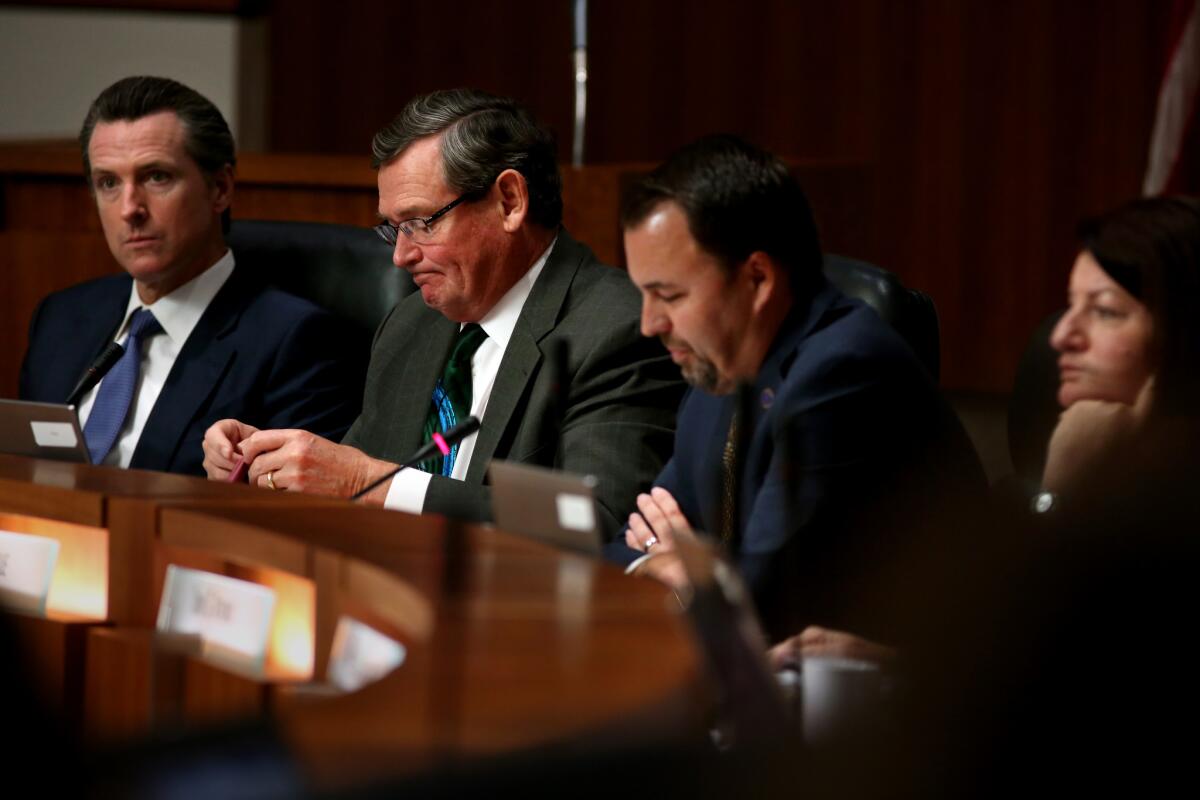Cal State sets policy on presidential pay

Lt. Gov. Gavin Newsom, left, Cal State Chancellor Timothy P. White, Chair Lou Monville and Assembly Speaker Toni Atkins in the Board of Trustees meeting where members voted on a revised compensation policy for Cal State executives.
- Share via
Cal State trustees approved a plan Wednesday to restrict pay for new campus presidents -- eliminating the use of private funds to supplement salaries -- in a move to quell criticism and controversy in the nation’s largest university system.
The policy, approved by the Board of Trustees on an 8-to-4 vote, essentially maintains the current practice of limiting increases for new executives to no more than 10% of their predecessor’s pay in most cases.
But the new plan eliminates the use of private foundation funds to supplement state-funded base pay.
The Times’ new education initiative to inform parents, educators and students across California >>
That practice was adopted on some campuses to save tax dollars during the recession but it posed conflict-of-interest concerns because most presidents also sit on the boards of campus foundations.
The new policy gives Chancellor Timothy P. White flexibility to negotiate above the 10% cap in “extraordinary” circumstances such as a candidate with special experience or knowledge.
Salaries at comparable institutions also will play a role in setting a pay range and could mean a candidate is offered less than what their predecessor makes. The new policy will apply to all executives, officials said.
White and the five campus presidents who currently receive foundation supplements will maintain those.
Board Chairman Lou Monville said he was responding to feedback from faculty, students, policymakers and others when he offered an alternative to the proposal on the agenda that would have lifted many of the restrictions on compensation for new presidents.
“My intention was to work in good faith with all stakeholders to find ways to continue to move the system forward as fiduciaries and be mindful of the ways we do that,” Monville said.
A high-profile dispute with faculty over salary increases played no role in revising the policy, he said.
The issue of executive compensation has proved thorny for Cal State, and trustees once again were confronted with appearances: the university system is currently locked in a contentious stalemate with its faculty union over salary increases for 2015-16. White is offering a 2% increase and the faculty group is demanding 5%.
Hundreds of faculty members protested at the board’s Tuesday meeting and their cause received a sympathetic hearing from state Assembly Speaker Toni G. Atkins, a trustee who took time from the meeting to address a raucous rally. Incoming Speaker Anthony Rendon (D-Lakewood) also attended the rally.
Gov. Jerry Brown has previously castigated Cal State officials for increasing pay for incoming presidents, especially during years when tuition was raised.
And a task force assembled by White has released a draft report that recommends incremental tuition increases for California residents and other dramatic changes.
The previous compensation policy, adopted in 2012, froze compensation paid with state funds while allowing a 10% increase paid with private donations.
On Wednesday, trustees were scheduled to consider a new plan that would set compensation based on the median salaries at comparable institutions with a cap of 10% above that average. Under that plan, the board also would have been able to exceed the cap under extraordinary circumstances.
But before the discussion, Monville offered new language to continue linking compensation for new presidents to that of predecessors, and eliminate the use of private foundation funding.
In adopting the revised policy, trustees may have been sensitive to assertions by faculty of misplaced priorities, said California Faculty Assn. President Jennifer Eagan. But, in the end, it appeared to be more window-dressing than substance, she said.
“We are still waiting for the board to discuss faculty salaries as seriously and as often as they devote to executive pay,” said Eagan, a professor at Cal State East Bay.
Officials have long argued that restricting compensation puts the 23-campus system at a disadvantage when trying to attract the most qualified candidates. With additional state funding flowing to campuses under Brown’s multi-year budget plan, linking pay to that of the incumbent no longer served the system, officials said.
Settling on a consistent compensation plan has taken on urgency as campuses in Chico, Channel Islands, San Jose, Sonoma and Stanislaus look to replace outgoing presidents.
Trustee Peter J. Taylor, who left before the vote, noted that competing with more “well-heeled” institutions for talented leaders places the system in a position “where it’s tough to win.”
He suggested broadening presidential searches to include business leaders and others “who maybe don’t have a traditional [academic] background but do have the skill set.”
That drew a response from Academic Senate Chairman Steven Filling. Faculty employees are not like other employees and often don’t like to do what they’re told, he joked.
Looking for campus leaders to focus on the business of education and cost reductions might optimize profits, but may not optimize “the public good,” Filling said.
Twitter: @carlariveralat
MORE EDUCATION NEWS
What’s different about the latest wave of college activism
Backlash brews against student race protests at Claremont McKenna College
Nonprofit is formed to advance charter-school plan in Los Angeles area
More to Read
Sign up for Essential California
The most important California stories and recommendations in your inbox every morning.
You may occasionally receive promotional content from the Los Angeles Times.











